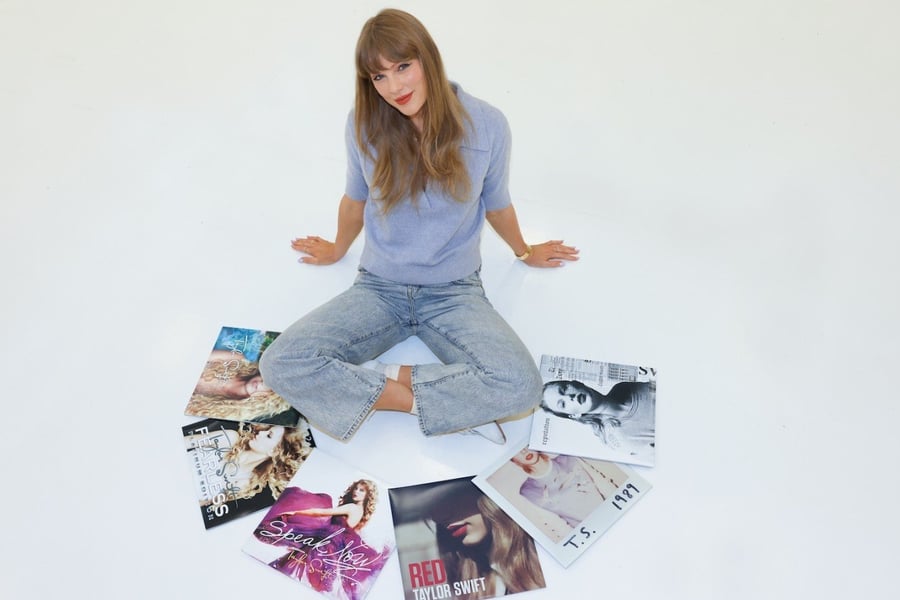Taylor Swift has regained control of her recorded music catalog six years after her old label, Big Machine Label Group, sold it to Scooter Braun’s Ithaca Holdings. The singer announced the purchase in a lengthy letter to her fans on Friday, writing on her website, “All of the music I’ve ever made now belongs to me.“
Swift announced the news Friday morning, May 30, with a long note to fans on her website, as well as a handful of photos on Instagram showing her with vinyl copies of her original records. “You belong with me,” she captioned the post.
The deal, as Swift wrote, covers not just the rights to her music — including unreleased tunes — but all of her music videos, concert films, and album art and photography, unreleased songs. And there are of course equally meaningful, more ephemeral aspects of the deal: “The memories. The magic. The madness,” Swift wrote. “Every single era. My entire life’s work.”
It’s unclear how much the deal is worth, but a source tells Rolling Stone that a previously reported price range of close to $600 million, which emerged when rumors of the sale first started circulating, was “highly inaccurate.”
Ithaca’s 2019 acquisition of Big Machine launched one of the most fascinating music industry sagas in recent years. While Big Machine owned the rights to music by an array of top country acts (Reba McEntire, Midland, and Sugarland, to name a few), Swift’s first six albums were arguably the crown jewels, and a major reason the sale was valued at around $300 million.
By the time Ithaca acquired Big Machine in summer 2019, Swift had already left the label and signed with Universal Music Group (the deal included provisions that would allow her to retain control of her master recordings). As Swift wrote in a blog post at the time, she was aware that, after leaving Big Machine, CEO Scott Borchetta was likely to sell the label—but she never expected Braun to be the buyer.
In that same post, Swift highlighted her contentious history with Braun, largely via his work with her longtime foe, Kanye West. She claimed, for instance, that Braun got West and Justin Bieber “to bully” her online amid the fracas over the leaked phone call regarding a lyric about Swift in West’s song “Famous.”
Love Music?
Get your daily dose of everything happening in Australian/New Zealand music and globally.
Swift said she was “sad and grossed out” over the deal, and claimed that any time Borchetta heard her speak Braun’s name, “it was when I was either crying or not to.”
On top of all that, though, was Swift’s desire to simply own the rights to her catalog. “For years I asked, pleaded for a chance to own my work,” she wrote. “Instead I was given an opportunity to sign back up to Big Machine Records and ‘earn’ one album back at a time, one for every new one I turned in. I walked away because I knew once I signed that contract, Scott Borchetta would sell the label, thereby selling me and my future. I had to make the excruciating choice to leave behind my past. Music I wrote on my bedroom floor and videos I dreamed up and paid for from the money I earned playing in bars, then clubs, then arenas, then stadiums.”
Within a few months of the sale, Swift began teasing her ambitious response: She would re-record her first six albums, thereby reclaiming some control over the music, while ostensibly diluting the value of the original recordings. In 2021, she launched her Taylor’s Version campaign with re-records of Fearless and Red, both of which were followed in 2023 by Speak Now and 1989. (Along with new versions of the original albums, the projects also included an array of previously-unreleased tunes now known as “vault tracks,” which were also re-recorded.)
Before all that, though, Swift’s catalog changed hands again. Just over a year after the Big Machine acquisition, Braun’s Ithaca Holdings sold Swift’s catalog to Shamrock Capital in a deal reportedly worth over $300 million. Prior to that sale, Swift revealed, she’d been trying to get back control of her masters, but claimed that Braun’s team was, as part of the deal, demanding she sign “an ironclad NDA” that would prevent her from speaking negatively about him. Swift also said she considered partnering with Shamrock until she found out that the deal terms would still result in Braun profiting off her old recordings for “a very long time.”
Braun, for his part, later expressed some regret over his handling of the Big Machine acquisition and Swift catalog sale. In a 2022 interview on NPR’s The Limits podcast, he admitted to coming from “a place of arrogance,” assuming that he and Swift could work things out. “The regret I have there is that I made the assumption that everyone, once the deal was done, was going to have a conversation with me, see my intent, see my character and say, great, let’s be in business together,” he said. “And I made that assumption with people that I didn’t know.”
From Rolling Stone US



































